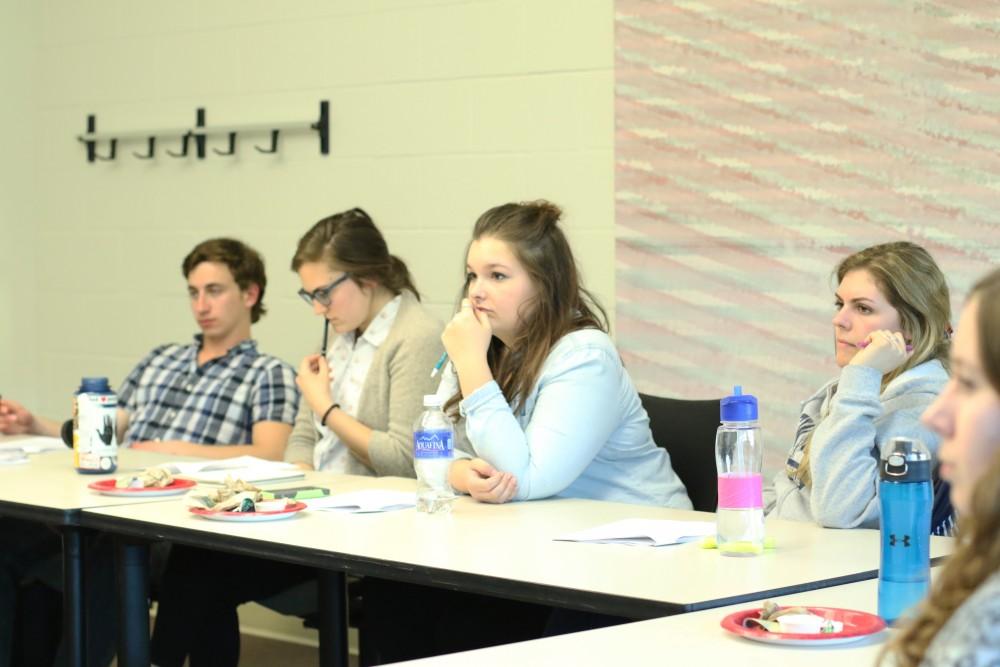Brooks College to offer new programs in the fall

GVL / Kasey Garvelink – Students participate in a group discussion at the Brooks College of Interdisciplinary Studies on Mar. 29, 2016 in Allendale.
Mar 31, 2016
Due to an increased interest for liberal arts classes and subjects, the Brooks College of Interdisciplinary Studies is now offering a wide variety of new courses this fall.
The new programs include a human rights minor, a liberal arts and professional skills certificate, a Latino studies certificate and new Latin American studies classes.
The liberal arts and professional skills (LEPS) certificate is a program geared towards liberal arts majors to expand their skill sets and prepare them for the professional world. The certificate includes 12 credit hours in classes that cover business communication, technological literacy, financial literacy, and two liberal arts courses to tie it all together.
“We designed this (program) so that students majoring in interdisciplinary programs and liberal arts and sciences would have the opportunity to pick up some additional workplace-related skills,” said Ellen Schendel, associate dean of the Brooks College of Interdisciplinary Studies.
The certificate aims to help students relate what they learned as a liberal arts student to real-world professions and to help translate the knowledge they learned in class into a career.
The human rights minor will cover human rights issues around the world. Students take several classes of their choice from a list of courses that cover human rights issues and related topics. To tie everything together, there is an introduction to human rights class at the beginning, and a reflection of human rights at the end of the program. A total of 19 credit hours are required for this minor.
“Students of any major can benefit from this minor,” Schendel said. “The ideas that students are studying in human rights (are) about justice, they’re about the treatment of humans, they’re about humanity and living in a better world. And that’s applicable from any vantage point.”
Also starting this fall, the Latin American and Latino/a studies (LAS) program is introducing a new certificate. The Latino/a studies certificate is a new program that was created to spread understanding about Latin Americans and their culture. Latin Americans are one of the fastest growing demographics in the U.S. and is an issue that is frequently brought to the front of many political discussions.
“(We’re trying) to build greater awareness of who Latinos are, a little bit about their culture, their history, their heritage,” said David Stark, coordinator of the LAS program. “The reasons that people want to come here are the same as they were in the past, but yet we are very fearful, we fear the other. So maybe we can help dispel some of those fears. ”
A better understanding of Latin Americans can come in handy in any field. Any profession that deals with people will benefit from greater cultural literacy.
“Any discipline, any field students are going into its helpful to understand another culture.” Schendel said.
The program is also designed for people that aren’t full-time students.
“We’re gearing the certificate not only for our students, but perhaps for somebody who maybe already has a degree, that works with Latinos or works with Hispanics and maybe they want to learn a little more about them,” Stark said.
The certificate differs from the existing Latin American studies minor in a few ways. It is 15 credit hours versus the minor’s 21-credit requirement, and it does not have a foreign language aspect like the minor does.
Besides this certificate, LAS is introducing two new classes and bringing back an old one. The program will introduce LAS 220, an introductory class, and LAS 325, a Latin American human rights class. Both of these classes fulfill credit for the Latin American studies minor and the Latino/a studies certificate, as well as general education requirement. The returning class is Latin American cinema.
There is a brand new class, called “Immigration: Think Global, Act Local,” that addresses the issues that immigration presents internationally, as well as in the communities that the immigrants come to. It helps students understand the impact of immigration, and how to address and interact with the issue. This class will fulfill an issues course and a general education course.






















